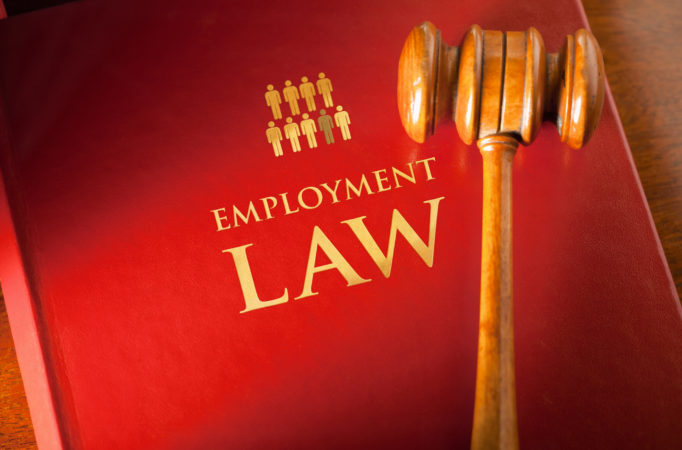Employment & Labor Law
The Coming Rule & Battle over Non-Compete Agreements
The battle over non-compete agreements is gearing up. The Federal Trade Commission voted last week to adopt a Final Rule, as promised back in January 2023, that largely bans non-competes. Lawsuits are being filed to block it. Here’s what you should know.
Effective Date:
This Final Rule is stated to go into effect 120 days after its publication in the Federal Register. When it will appear in the Federal Register is yet to be determined, as various internal government reviews must first occur now that the FTC has approved it (by a 3-2 vote). So, be on guard and get ready.
Legal Challenges:
I predict that one or more federal district courts will issue an injunction banning enforcement of this rule, and that it will take quite some time to complete the appeal process. A couple lawsuits have already been filed against the Rule in federal court in Texas. Congress also has the power to enact legislation with different limitations. While awaiting these challenges and potential changes, here are some key points and considerations for organizations, executives (who are often on both sides of this subject in imposing non-competes on their employees and required to sign one themselves), employees, and independent contractors.
Non-Compete Ban in FTC Final Rule:
The Final Rule bans entering into or enforcing non-compete agreement provisions with employees and independent contractors after the effective date of the Rule. There are a few exceptions and coverage exclusions, described below.
Retroactivity:
The Final Rule permits enforcement of non-compete agreements where the claimed violation occurred prior to the effective date of the Final Rule. Thus, it will not stop lawsuits already underway when the Final Rule goes into effect (or that are filed after the Rule’s effective date but concern breaches prior to that date).
Exceptions & Coverage Exclusions:
(a.) Senior Executives: Non-compete agreements entered into prior to the effective date of this FTC Final Rule (i.e., 120 days from the yet to occur publication of this Final Rule in the Federal Register) are permitted for “senior executives” who the Rule defines as someone earning at least $151,164 in the preceding year and with “policy making authority” for the organization. “Policy-making authority” means “final authority to make policy decisions that control significant aspects of a business entity or common enterprise,” and does not include those who advise or influence but do not make such decisions.
(b.) Sales of Business Ownership: The FTC final rule permits non-competes entered into as part of a bona fide sale of a business by an owner.
(c.) Moonlighting: The ban only applies to non-compete restrictions following the end of employment or a work engagement. Non-competes during the time of employment or an independent contract relationship are not restricted by the Rule.
(d.) Non-Profits, Work outside the U.S., and Certain Industries: The Final Rule does not apply to non-profit organizations or to work done outside the U.S. There are also several industries excluded from the Final Rule because they are outside the FTC’s jurisdiction per the Federal Trade Commission Act. These are banks, savings and loan institutions, federal credit unions, common carriers, air carriers, and persons/businesses covered by the Packers and Stockyards Act.
Interaction with State Law:
The Final Rule permits states to apply more protections for employees and independent contractors than those in the Rule.
Notices Required:
The Final Rule calls for organizations with agreements banned by the Rule to individually notify each person covered by such an agreement that the organization can no longer and will not try to enforce those non-compete provisions. This notice is to be issued to the worker by mail, e-mail, or text. The Final Rule contains a suggested model notice provision.
What about other Restrictive Covenants, such as Non-Solicitation Agreements?
The Final Rule does not ban non-solicitation agreements (e.g., bans on solicitation of customers or employees) or non-disclosure/confidentiality agreements, unless, says the FTC, they are written so broadly as to “function to prevent a worker from working for another employer in the same field and are therefore non-competes under [the Final Rule.]” As an example, the FTC’s explanatory comments in the Final Rule state that non-disclosure clauses amount to a banned non-compete when “they span such a large scope of information that they function to prevent workers from seeking or accepting other work or starting a business after they leave their job.”
What Should Employers, Employees, and Independent Contractors Do Now?
A more definitive answer to this question depends on the outcome of the legal challenges to this Final Rule. In the meantime, employers should consider several different options that largely turn on whether the organization wishes to try to protect itself as much as possible or decides to avoid the legal fray. Protection by employers may mean adding alternative provisions to non-compete agreements to account for potential outcomes of the legal challenges to this Final Rule.
Employers can instead decide to avoid the legal challenges by using non-solicitation agreements without non-compete restrictions — that is, permitting subsequent work for a competitor provided the individual does not go after or do work for the former employer’s customers or try to hire its employees for a period of time.
Employers who want but do not yet have non-competes with “senior executives” will want to do so prior to the effective date of the Final Rule because, if upheld, the Final Rule does not permit such agreements signed after the effective date (described above).
An important item for employers to check in this process is equity vesting agreements, as these often contain non-compete agreements. The effect of the Final Rule in these circumstances is uncertain. A key legal battle will be whether an equity plan that provides a financial loss or disincentive to leaving and taking a job with a competitor, rather than an outright ban on working for a competitor, is lawful even if the Final Rule is upheld as presently written. This approach may be a reasonable way of hedging the risks given the present uncertainties. The FTC’s comments in the Final Rule imply that non-compete restrictions in equity award plans are also banned under the Rule. I predict that, even if the Final Rule is ultimately upheld in the courts, that will not necessarily negate an equity plan that is written so as to cause the loss of an equity award in the event the employee leaves to take a job with a competitor rather than requiring the employee to agree to a non-compete as part of participation in the equity award program. Such a provision would be a financial incentive, like a retention bonus, which employees can choose to forgo based on an offer from a competitor. There are plausible and strong arguments that financial incentives may be permissible as different than an outright bar to working for a competitor for a period of time.
Similarly, employers may consider golden parachutes—or hand-cuffs depending on your perspective—as an alternative to a non-compete agreement. This would essentially be a severance pay arrangement that conditions payment on the former employee refraining from employment with a competitor for a period of time. As with an equity award condition mentioned above, the employee could choose to lose the severance money by going to a competitor but the employer wouldn’t be able to get a court to bar the individual from being employed by the competitor. Again, it is uncertain how the courts would view this if the Final Rule is upheld. This uncertainty may prompt use of a more detailed severability provision that deals with the impact of future court decisions about the lawfulness of non-competes.
It should also be remembered that, in addition to restrictive covenants such as non-competes, employers and other organizations have protection under trade secret and proprietary business information statutes and agreements. These items generally have narrower restrictions, but they are important tools in employment agreements and post-employment legal challenges. The FTC’s explanatory comments to the Final Rule, as mentioned above, only take issue with restrictive covenants other than non-competes when they are so broad as to practically amount to a non-compete (which can be dealt with both in drafting such agreements and in choosing how to apply/enforce them).
Employees will now have more leverage in trying to avoid signing or to soften restrictive covenant agreements sought by prospective employers while the legal battles continue. There are agreement provision variations that can be used for this purpose.
This is also a time for employers and employees to review state law limitations on existing or new non-compete and other restrictive covenant agreements. Noncompliance may render the agreement worthless, as state law protections for employees still apply with or without the Final Rule. For example, in Pennsylvania a noncompete (or other restrictive covenant) is invalid if an employee did not receive something of value beyond what they already had with the organization requiring the restrictive covenant agreement (e.g., a sufficient increase in compensation or job security) in return for signing it (continued employment is not enough). Too many employers in Pennsylvania overlook this.
The negotiations over employment agreement restrictive covenants are getting even more interesting and nuanced. So, start getting ready for and achieving your goals during the upcoming period of uncertainty. If you’d like to discuss this further, please contact attorney Craig M. Brooks or Brian D. Lipkin of the Houston Harbaugh Employment and Labor Law Group.
About Us
Claims and suits brought against employers by employees are a large part of the cases being handled by the Employment lawyers at Houston Harbaugh. We focus on assisting and counseling our clients to be positioned to avoid claims, and if the claims are brought, to be prepared to defend against them.

Craig M. Brooks - Practice Chair
An employment and labor attorney, Craig primarily represents management, providing advice on how to handle employee issues and actions, as well as defending or pursuing claims in court and before government agencies on matters.
An employment and labor attorney, Craig primarily represents management, providing advice on how to handle employee issues and actions, as well as defending or pursuing claims in court and before government agencies on matters including:
- Employment discrimination claims
- Wage and hour matters
- Sexual and other harassment investigations and claims
- Family and Medical Leave Act
- Wrongful discharge
- Labor/Union matters
- Restrictive covenants
- Affirmative action programs
- Defamation
- Privacy
Craig also represents individuals with advice and pursuing claims arising out of their employment.

